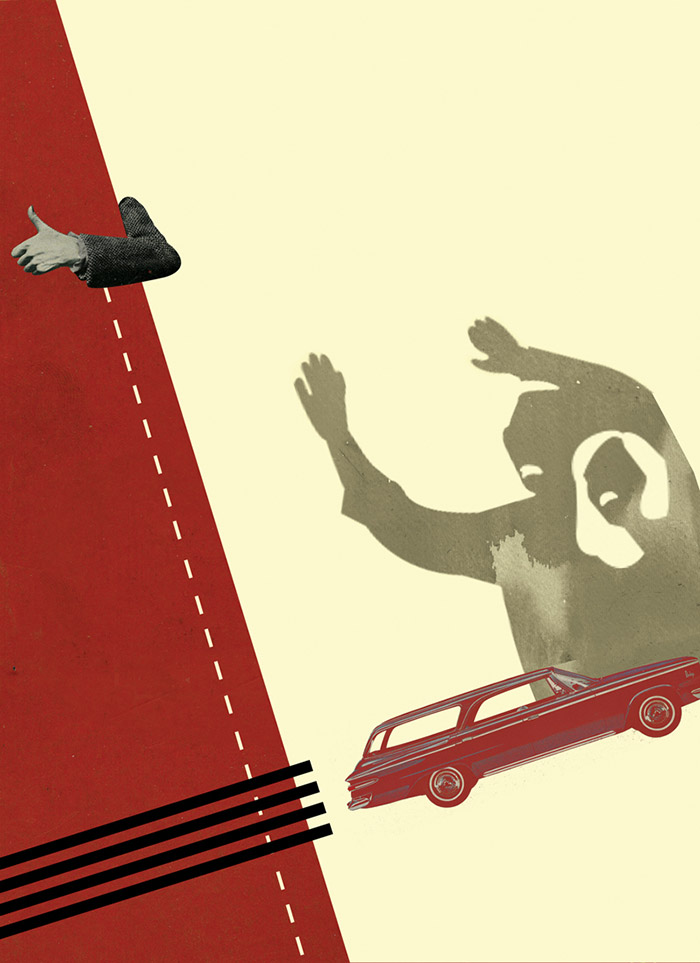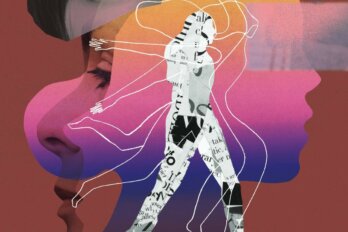
It was a dream first apartment. Three bedrooms, high ceilings, a prime location just two doors down from the record store that employed me and within walking distance of my classes at the University of Toronto: all for $1,200 a month. From the spacious living room—in regal disrepair, with its chipped burgundy walls—I could look onto Queen Street West and into the windows of streetcars I’d taken to and from my parents’ home in the Beach. Seeing the place for the first time felt like spotting a streetcar in the distance after an hour’s wait: less relief than frustration it had taken so long.
I was twenty-one years old and had never planned in earnest to move out of my parents’ home. I was so accustomed to having things done for me that I imagined a place would fall into my lap. Sure enough, it did. One slow day behind the counter, my coworker Nick received a call from Jen (names have been changed), a former workmate whose approachability belied her stature in Canadian music and her reputation as a party girl—I could barely talk to her for thoughts of all the things she’d already done that I’d never have the guts to try. She was calling because she’d found an apartment on Palmerston Avenue, the downtown renter’s holy grail, and was quitting the place she’d lived in for the greater part of a decade, a local institution that had hosted so much sex and so many drugs that, an acquaintance joked, one could get high by licking the walls. The apartment was Nick’s if he wanted it. “Holy shit,” he’d said, as he hung up. Then: “Know anyone who needs a place?”
Matt, my boyfriend at the time, helped pitch the plan to my parents, who listened warily. Maybe they sensed my own uncertainty; after all, I had never thought about life away from them in more than abstract terms. I wasn’t entirely happy at home: the commute was a bitch, and I certainly would have liked more than a thin wall’s buffer between my parents’ room and mine. But I didn’t want for quality of life. My parents took out the garbage, bought wine I couldn’t afford, and refilled the fridge each Saturday with goodies from the farmers’ market. Furthermore, they imposed few restrictions on me. I smoked cigarettes on the porch (not that they were thrilled about it), and came home whenever it suited. Half the time I stayed with Matt, who had, over the years, evolved into a sort of proxy parent: keeping me out of trouble, nodding indulgently while I rambled and complained. There was no incentive to get out save for dignity, which was easily trumped by freedom from want.
Mom and Dad came to see the place on a soggy day in January. Jen’s boyfriend, who played in a band I liked, fielded my parents’ anxious questions and listened to them reminisce about their first apartment on Yonge Street in the ’70s. They inspected my prospective home with professional rigour: its vintage fridge would double my energy bill, they warned; the front door, which opened onto an alleyway populated by a revolving cast of indigents, was more a rickety obstacle than a solid barrier. My father, testing the water pressure, no doubt, spotted a cockroach behind the toilet. The landlords, they intuited, were absent all days save the first of each month. But it’s cheap, I reminded them; I’d never find anything better in this location. My mom offered to subsidize a better place if I’d only wait for one, but I’d made up my mind, and, that being the case, they weren’t about to withhold help from their only child.
No sooner had their help been offered—of course, I’d presumed it—did I stop thinking altogether about what the move would require of me. It was second nature to hand over life’s responsibilities to my parents, particularly my mother, who had mostly given up on teaching me how to take care of myself and found a beleaguered gratification in doing it all for me. I had become the life’s work she had been too long labouring over to complete, and her fear of finishing was manifest in her temper. She defended her domain fiercely, shouting down my half-assed offers to take over my share. “But ya don’t do it, Alexandra,” she yelled, in her southern Ontario intonation, as she washed my dishes. “Ya don’t do it and ya leave a friggin’ mess everywhere ya go.” When it dawned on me that I ought to take a more active role in planning my maiden voyage out of the nest, she charged: “Then do it yourself! Ya think ya know everything, Alexandra? Do it yourself, and see if I care!” Then she went out and bought me a month’s supply of tomato soup.
She hadn’t had it so easy. Born the only child of a mixed-race couple—one of the only Chinese mutts in Galt, Ontario (now Cambridge), but, according to one storekeeper who’d seen the name on her credit card, lucky enough not to look it—she was raised in a family of eleven children. At sixteen she’d left home to find herself, working various jobs and eventually obtaining a social work degree from Ryerson Polytechnical Institute (now University). Over in the region’s honky enclave (that’s slang for “Ukrainian”), my dad endured the histrionics of a war-scarred mother with support from the marijuana that his older brother picked up in the big city. Their parents had met, after a decade spent cheating death, at a dance organized for the Slavic contingent of their war camp in Germany. They arrived in Canada, by grace of God, to raise four sons in peace and relative prosperity. In the ’60s, those sons rejected their parents’ cabbage rolls and coffee in favour of pot and LSD (they took, however, to the vodka).
The irony of raising children with all you never had is that they grow up blissfully unaware of what you went through; and since the less you had, the more you give, chances are they’ll do nothing but take. Sooner or later the giving becomes pathological, while the taking undermines the values the parents tried to instill in the first place: generosity, conscientiousness, reciprocity. And so I tagged along ungratefully while my parents bought me house paint, kitchen supplies, a vacuum; lingered smoking in the kitchen while my mother cleaned the cupboards; nursed my feeble arms while my father coated the ceiling of my new room in crisp white. I staggered limply down the aisles of Ikea in search of the bed they planned to buy me, then, straddling the mattress in the back of the moving van my father had rented, bounced off and sliced open my wrist on the vehicle’s metal interior. My mother escorted me to the hospital while father and boyfriend completed the move.
That night, Matt kept me company in my new digs, a cavernous, windowless room freshly painted nursery blue. We watched a horror movie and I fought back embarrassed tears, feeling as homesick as I had as a child when, during a three-day stay at a friend’s house in Peterborough, I’d bawled and begged to be driven home at one in the morning. I never could spend a day away from my parents without feeling estranged, nor a day with them without raising my voice.
During the few years at home when I’d had a curfew, I’d dreamed of the great roommates I would have when I moved out (at eighteen, naturally). We’d have decorating projects together and bake and make zines; we’d play in a band and entertain attractive men every night. By my early twenties, I was domestically impaired, reluctantly monogamous, and well aware that my free time was better spent on things I was actually good at (moreover, I would have considered a zine-making, guitar-strumming roommate with a stream of handsome gentlemen callers very obnoxious). But I regretted never having experienced independence while I was still young enough to really enjoy it (despite my circumstances, I thought myself a very worldly twenty-one), and I hoped the new place would, at least, provide a taste.
Enter Emily, mine and Nick’s third roommate, a pixie-like performance artist with a light, often barefoot gait. She was interesting and surrounded by interesting people, many of whom she invited to our housewarming party, which doubled as a birthday get-together for me. It was a fitting inauguration for my new life in my storied apartment: Emily’s many friends, musicians and artists all, were the people I’d spent my teens trying to become friends with. Now they were jamming my very own hallway, using my very own toilet, and mingling just a locked door away from the place where I slept and stored my belongings. I felt like I’d done my seventeen-year-old self proud, deliberately ignoring the fact that half of our guests barely knew my name, much less that I was Emily’s roommate. As for Emily, she spent the night in the kitchen, making pizzas and baking me a cake, which my friends ravaged as soon as it cooled. With full mouths, they confirmed that we’d thrown a great party.
The early days with Emily were fun, if a little strained. We shared wine and cigarettes in the kitchen, our de facto smoking room, and watched All About My Mother and Tetsuo: The Iron Man on the living room wall with her film projector. She shared great gossip and anecdotes about her adventures on other continents. My exchanges with Nick, on the other hand, usually happened in short, funny blasts. We smoked the occasional joint together and I listened intently as he ranted about our formerly shared workplace—soon after the move I had stopped working, leaving the bulk of the rent to my parents.
Rent wasn’t the only thing I left to them. Their parenting was nearly as attentive remotely as it had been directly. Living alone, it turned out, was a lot like camp: a modicum of independence enjoyed at my parents’ expense. Several months into my emancipation I still hadn’t gotten the hang of grocery shopping, or of the laundromat across the street. So every Saturday my parents pulled into the driveway—sidestepping the occasional pile of human shit as they exited the car—bearing food, household supplies, and, often, clothes. Their arrival was heralded by heavy shuffling on the front steps and the thud of parcels on the kitchen counter, then a dreadful volley of creaks as they paraded my big, blue laundry bag down the hall, sometimes in view of Emily and her friends. I shrank into my bedroom, where I waited quietly until it was time to mumble, Thanks, Love you, Bye.
Nick, who could barely conceive of such lavish parenting, would frequently remark on how awesome mine were. Feeling guilty, I responded in the worst possible way: I’d contradict him, scrounging up tales of run-of-the-mill family spats to prove my point. Before the move, I’d often compared my living situation to Sartre’s No Exit: my parents and I seemingly condemned to a suffocating companionship for all eternity. In fact, the phrase “Hell is other people” applied more accurately to my relationship with my roommates; their scrutiny made me realize just how spoiled I was. As my dishes piled up in the sink, as I forgot to take out the garbage, as I yelled at my computer screen during my morning globeandmail.com scroll, I resented their censure preemptively, and, soon enough, I resented them personally. It was self-fulfilling prophecy: the Entitled Brat is the most reviled of Echo Generation stereotypes—mostly because so many of us are—and so neatly did it fit me that I felt compelled to act the part.
As my relationship with my roommates declined, so did the state of our apartment. The living room cluttered with books and blankets and cables; the kitchen table, barely accessible for empty wine boxes, became grey with smudged ashes. That October I threw a Hallowe’en party, assuming Emily’s buddies would fatten the guest list; when she told me she had other plans for the night, I’d called up a friend at the last minute and begged her to cohost. Emily helped us decorate, and then, like a big sister leaving the girls to their slumber party, absconded to her room. (The party ended abruptly with me vomiting into a bucket, while Matt held back my hair and ushered out the remaining guests.) I had spent $200 on decorations, many of which still littered the apartment in January: red, half-deflated balloons I’d painted with blue veins, now shedding blue paint chips onto the floor; jars containing inflated sponges in the shapes of viscera. These, I’m sorry to say, were not the apartment’s nastiest quirks. By then the mice had established a presence in every room, and the kitchen seemed the rodent Big Smoke. The pink-powder bait we sprinkled on the floor every night yielded nothing but a fresh carpet of mouse shit the next morning.
Most nights I slept at Matt’s tiny bachelor—he, at least, tolerated the apron strings. He killed bugs for me and cleaned up my messes along with his own, kvetching only a little. When I headed back to the folks’ for the odd night, it felt like escaping to some glorious cottage. I’d stuff my face with exotic snacks and drink wine that came from bottles, for a change, all the while basking in their AC and the comfort of dishes and clothes that cleaned themselves.
Back at the apartment, something had to give, and it was Nick. One night in late winter, just a year after we’d arrived, he confirmed his plans to move out, and Emily floated her intention to move her boyfriend in, if neither of us had a problem with that. I was furious, but kept my mouth shut as I poured coffee grounds into a few squares of toilet paper, filters being long gone, paper towels having followed. The next day I called my parents. They were, of course, delighted, if unsurprised.
Nick moved out without saying goodbye; for the next month or two, it was Emily and me without a buffer. I kept my head down, wrote my last undergraduate exams, and secured myself an internship for the summer. A year after our first party, I threw my last, a birthday-cum-“get the fuck out” fête. Emily made herself scarce, and I hosted without worrying about how the place would look the morning after. The following week, my parents came to move me out. “Jesus Christ, Alexandra,” my dad said as he inspected the hasty packing job I’d done the night before. “What on earth possessed you to pack 300 CDs into one fucking box?”
That evening, as we sped home along the Gardiner Expressway, I slumped against the upholstery with my headphones on and smoked Camels out the window. “Relieved to be back?” my mother asked. I stretched my legs along the backseat and ignored her.
This appeared in the September 2010 issue.



